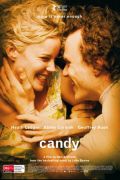
Directed by
Neil Armfield
108 minutes
Rated MA
Reviewed by
Sharon Hurst

Candy
Synopsis: Beautiful and talented young art student Candy (Abbie Cornish) is in love with Dan (Heath Ledger), a bohemian poet and heroin user. They believe their love to be enhanced by heroin, wallowing in drug-augmented states of bliss, but as Candy becomes hooked, the lovers begin a downward spiral involving the usual adjuncts: theft, prostitution, despair and denial.
Armfield is one of Australia’s highly respected theatre directors, with his previous film credits being Twelfth Night (1987) and The Castanet Club (1990) and a few telemovies. After falling under the spell of the novel upon which the film is based, he wanted to explore the paradox that the most attractive things in life can also be the things that destroy us. This is Candy’s nature – the sort of girl who is willing to live life to extremes; to endlessly pursue “the rush” and the elusive feeling of being able to transcend the everyday and live on a higher plane, despite the dangers involved. Drug use has long been associated with artistic pursuits and the romantic bohemian life. Certainly Dan sees it this way but it is Candy’s ghastly unravelling that hits us hardest as an example of the nightmare that heroin addiction is.
Everyday “normality” is represented by Candy’s parents (Tony Martin and Noni Hazelhurst), loving middle class people who are wracked by their daughter’s decline, but whose uptightness and difficulty in communicating have also contributed in some way to Candy’s alienation. The strange twilight world of addicts who appear to function in day-to-day life is inhabited by Dan’s friend Caspar (Geoffrey Rush), a chemistry professor, committed junkie and unintentional collaborator in the couple’s decline.
Whilst both Ledger and Cornish are perhaps a tad too conveniently photogenic Candy certainly does not glamorise heroin addiction. Then again nor does it condemn it. Rather it shows its terrible destructiveness, whether it is to substances or to love. Both addictions seem inseparable for these two. There is a strong erotic charge between Dan and Candy and the constant interplay of their romance versus the living hell of their addiction creates strong dramatic tension.
All the performances are splendid. Ledger is compelling as the charming but weak-willed addict whilst Cornish, who came to everyone's attention in Somersault, (2004) commands the screen with her translucent beauty, Rush is at his best as the amoral Caspar, and Hazelhurst very effective as the emotionally-distant, disapproving mother, while Martin is strong as the father at a loss as to what to say or do in a situation beyond his understanding.
Candy is not for the faint-hearted. Just as Darren Aronofsky’s Requiem for a Dream (2000) painted a harrowing picture of drug addiction, so this film will fill you with a justified repugnance at the thought of ever being in the grip of such a destructive force. And yet its capturing of such powerful love and its moments of redemption give Candy a strange and compelling beauty.

Want more about this film?


Want something different?




